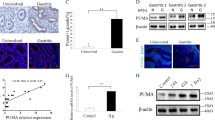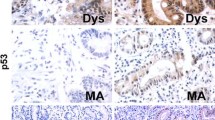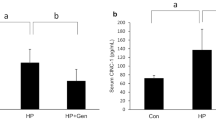Abstract
Helicobacter pylori induces apoptosis and alters the proliferation of gastric mucosal epithelial cells. Cyclooxygenase-2 (COX-2), the inducible form of prostaglandin (PG) synthesis, is known to cause alteration in epithelial cell growth. The goal of this study was to determine whether COX-2 gene expression by H. pylori infection could influence gastric epithelial cell apoptosis. Expression of COX-2 mRNA and proteins was up-regulated in Hs746T gastric epithelial cell lines infected with H. pylori, when assessed by quantitative RT-PCR and western blot. Inhibition of COX-2 expression using NS-398, a specific COX-2 inhibitor, showed a significant increase of gastric epithelial cell apoptosis and caspase-3 activation in Hs746T cells infected with H. pylori. Moreover, the effect of NS-398 on H. pylori-induced apoptosis was reversed by the addition of PGE2. These results suggest that up-regulated COX-2 expression by H. pylori infection can inhibit apoptosis of gastric epithelial cells.
Similar content being viewed by others
REFERENCES
NIH: Consensus Development Panel on Helicobacter pylori in peptic ulcer disease. JAMA 272:65-69, 1994
Fraser AG, Sim R, Sankey EA, Dhillon AP, Pounder RE: Effect of eradication of Helicobacter pylori on gastric epithelial cell proliferation. Aliment Pharmacol Ther 8:167-173, 1994
Peek RM, Moss SF, Than KT, Perez-Perez GI, Wang S, Miller GG, Atherton JC, Holt PR, Blaser MJ: Helicobacter pylori cagA1 strains and dissociation of gastric epithelial cell proliferation from apoptosis. J Natl Cancer Inst 89:863-868, 1997
Robert JM, Searle JW, Cooksley WG: Histological patterns of prolonged hepatitis C infection. Gastroenterology 26:37-41, 1993
Zychlinsky A, Sansonetti P: Apoptosis in bacterial pathogenesis. J Clin Invest 100:493-495, 1997
Kim JM, Eckmann L, Savidge TC, Lowe DC, Witthoeft T, Kagnoff MF: Apoptosis of human intestinal epithelial cells after bacterial invasion. J Clin Invest 102:1815-1823, 1998
Hall PA, Coates PJ, Ansari A, Hopwood D: Regulation of cell number in the mammalian gastrointestinal tract: the importance of apoptosis. J Cell Sci 107:3569-3577, 1994
Moss SF, Calam J, Angarwal B, Wang S, Holt PR: Induction of gastric epithelial apoptosis by Helicobacter pylori. Gut 38:498-451, 1996
Wagner S, Beil W, Westermann J, Logan RP, Bock CT, Trautwein C, Bleck JS, Mannus MP: Regulation of gastric epithelial cell growth by Helicobacter pylori: Evidence for a major role of apoptosis. Gastroenterology 113:1836-1847, 1997
Fan X, Crowe SE, Behar S, Gunasena H, Ye G, Haeberle H, van Houten N, Gourley WK, Ernst PB, Reyes VE: The effect of class II major histocompatibility complex expression on adherence of Helicobacter pylori and induction of apoptosis in gastric epithelial cells: A mechanism for T helper cell type 1-mediated damage. J Exp Med 187:1659-1669, 1998
Kim JM, Kim, JS, Jung HC, Song IS, Kim CY: Apoptosis of human gastric epithelial cells via caspase-3 activation in response to Helicobacter pylori infection: Possible involvement of neutrophils through tumor necrosis factor-alpha and soluble Fas ligands. Scand J Gastroenterol 35:40-48, 2000
Smith WL, Dewitt DL: Prostaglandin endoperoxidase H synthase-1 and-2. Adv Immunol 62:167-215, 1996
Tsujii M, DuBois RN: Alterations in cellular adhesion and apoptosis in epithelial cells overexpressing prostaglandin endoperoxide synthase-2. Cell 83:493-501, 1995
Tsujii M, Kawano S, DuBois RN: Cyclooxygenase-2 expression in human colon cancer cells increases metastatic potential. Proc Natl Acad Sci USA 94:3336-3340, 1997
Uefuji K, Ichikura T, Mochizuki H, Shinomiya N: Expression of cyclooxygenase-2 protein in gastric adenocarcinoma. J Surg Oncol 69:168-172, 1998
Murata H, Kawano S, Tsuji S, Tsuji M, Sawaoka H, Kimura Y, Shiozaki H, Hori M: Cyclooxygenase-2 overexpression enhances lymphatic invasion and metastasis in human gastric carcinoma. Am J Gastroenterol 94:451-455, 1999
Eckmann L, Stenson W, Savidge TC, Lowe DC, Barrett KE, Fierer J, Smith JR, Kagnoff MF: Role of intestinal epithelial cells in the host secretory response to infection by invasive bacteria. J Clin Invest 100:296-309, 1997
Romano M, Ricci V, Memoli A, Tuccillo C, Popolo AD, Sommi P, Acquaviva AM, Del Vecchio Blanco C, Bruni CB, Zarrilli R: Helicobacter pylori up-regulates cyclooxygenase-2 mRNA expression and prostaglandin E2 synthase in MKN 28 gastric mucosal cells in vitro. J Biol Chem 273:28560-28563, 1998
Kim JS, Jung HC, Kim JM, Song IS, Kim CY: Helicobacter pylori water-soluble surface proteins activate human neutrophils and upregulate the expression of CXC chemokines. Dig Dis Sci 45:83-92, 2000
Jung HC, Kim JM, Song IS, Kim CY: Helicobacter pylori induces an array of proinflammatory cytokines in human gastric epithelial cells: quantification of mRNA for interleukin-8, 21a/b, granulocyte-macrophage colony-stimulating factor, monocyte chemoattractant protein-1 and tumor necrosis factor-a. J Gastroenterol Hepatol 12:473-480, 1997
Jobin C, Morteau O, Han DS, Sartor RB: Specific NF-kappaB blockade selectively inhibits tumour necrosis factor-alphainduced COX-2 but not constitutive COX-1 gene expression in HT-29 cells. Immunology 95:537-543, 1998
Futake N, Takahashi S, Yokoyama M, Arai I, Higuchi S, Otomo S: NS-398, a new anti-inflammatory, selectively inhibits prostaglandin G/H synthase/ cyclooxygenase (COX-2) activity in vitro. Prostaglandins 47:55-59, 1994
Bhattacharyya DK, Lecomte M, Dunn J, Morgans DJ, Smith WL: Selective inhibition of prostaglandin endoperoxide synthase-1 (cyclooxygenase-1) by valerylsalicylic acid. Arch Biochem Biophys 317:19-24, 1995
Koopman G, Reutelingsperger CP, Kuijten GA, Keehnen RM, Pals ST, van Oers MH: Annexin V for flow cytometric detection of phosphatidylserine expression on B cells undergoing apoptosis. Blood 84:1415-1420, 1994
Zamzami, N, Marchetti P, Castedo M, Zanin C, Vayssiere JL, Petit PX, Kroemer G: Reduction in mitochondrial potential constitures an early irreversible step of programmed lymphocyte death in vivo. J Exp Med 181:1661-1672, 1995
Blaser MJ, Perez-Perez GI, Kleanthous H, Cover TL, Peek RM, Chyou PH, Stemmermann GN, Nomura A: Infection with Helicobacter pylori strains possessing cagA is associated with an increased risk of developing adenocarcinoma of the stomach. Cancer Res 55:2111-2115, 1995
de Figueierdo Soares T, de Magalhaes Queiroz DM, Mendes EN, Rocha GA, Rocha Oliveira AM, Alvares Cabral MM, de Oliveira CA: The interrelationship between Helicobacter pylori vacuolating cytotoxin and gastric carcinoma. Am J Gastroenterol 93:1841-1847, 1998
Ristimake A, Honkanen N, Jankala H, Sipponen P, Harkonen M: Expression of cyclooxygenase-2 in human gastric carcinoma. Cancer Res 57:1276-1280, 1997
Miehlke S, Go MF, Kim JG, Graham DY, Figura N: Serologic detection of Helicobacter pylori infection with cagA-positive strains in duodenal ulcer, gastric cancer, and asymptomatic gastritis. J Gastroenterol 33:18-21, 1998
Yamaoka Y, Kodama T, Gutierrez O, Kim JG, Kashima K, Graham DY: Relationship between Helicobacter pylori iceA, cagA, and vacA status and clinical outcome: Studies in four different countries. J Clin Microbiol 37:2274-2279, 1999
Jung HC, Kim JM, Song IS, Kim CY: Increased motility of Helicobacter pylori by methylcellulose could upregulate the expression of proinflammatory cytokines in human gastric epithelial cells. Scand J Clin Lab Invest 57:263-270, 1997
Elewaut D, DiDonato JA, Kim JM, Truong F, Eckmann L, Kagnoff MF: NF-kappa B is a central regulator of the intestinal epithelial cell innate immune response induced by infection with enteroinvasive bacteria. J Immunol 163:1457-1466, 1999
Keates S, Hitti YS, Upton M, Kelly CP: Helicobacter pylori infection activates NF-kappa B in gastric epithelial cells. Gastroenterology 113:1099-1109, 1997
Shift SJ, Rigas B: Nonsteroidal anti-inflammatory drugs and colorectal cancer: Evolving concepts of their chemopreventive actions. Gastroenterology 113:1992-1998, 1997
Tsujii M. Kawano S, Tsuji S, Sawaoka H, Hori M, DuBois RN: Cyclooxygenase regulates angiogenesis induced by colon cancer cells. Cell 93:705-716, 1998
Author information
Authors and Affiliations
Rights and permissions
About this article
Cite this article
Kim, J.M., Kim, J.S., Jung, H.C. et al. Upregulated Cyclooxygenase-2 Inhibits Apoptosis of Human Gastric Epithelial Cells Infected with Helicobacter pylori. Dig Dis Sci 45, 2436–2443 (2000). https://doi.org/10.1023/A:1005611613542
Issue Date:
DOI: https://doi.org/10.1023/A:1005611613542




